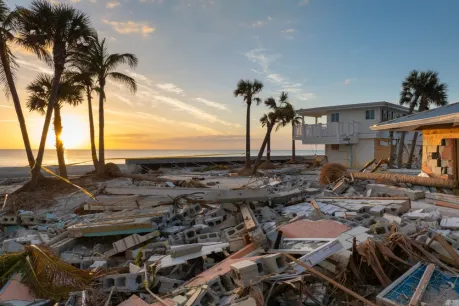What Happens to Your Paycheck When a Natural Disaster Hits?

Injured?
Hurricanes, wildfires, floods, and natural disasters can bring everything to a standstill. But even when the world feels upside down, your paycheck shouldn’t disappear.
Whether you cannot work because your job site is shut down or you’re clocking in extra hours to help your community recover, federal labor laws still apply, disaster or not.
You Must Be Paid for the Hours You Worked
If you’re a covered, non-exempt employee (which includes most hourly workers), the Fair Labor Standards Act guarantees your right to fair pay. That means your employer must pay you at least the federal minimum wage for every hour you work, even during a crisis.
If you worked over 40 hours in a single workweek, you’re also entitled to overtime pay at time-and-a-half. There are no exceptions for natural disasters.
Even if your workplace closes, loses power, or can’t access payroll systems, the law doesn’t excuse them from paying you for time already worked. Your labor still counts—and so does your paycheck.
Can’t Get Your Last Paycheck?
Sometimes, when a natural disaster hits, businesses shut down quickly. Nine times out of ten, that happens, leaving workers scrambling to get their last paycheck. If your workplace closed and you're having trouble getting paid, you're not out of options.
Contact Morgan & Morgan; we can review your case and fight to recover the wages you’ve earned.
If You Didn’t Work, Your Employer Doesn’t Have to Pay
Here’s a hard truth: if your job shuts down because of a natural disaster and you didn’t work any hours, your employer is generally not required to pay you under the FLSA.
They may only be required to pay you if you’re a salaried exempt employee.
For hourly (non-exempt) workers, the law only requires employers to pay for time actually worked. So, if you normally work five days a week but only work two days before your workplace closes, your employer only has to pay you for those two days.
What About Unemployment During a Disaster?
If you’re out of work due to a natural disaster, you might be eligible for Disaster Unemployment Assistance. This benefit helps workers who lost their job or can’t get to work because of a federally declared disaster.
To find out if you qualify, review the Disaster Unemployment Assistance program through the U.S. Department of Labor and look into your state’s unemployment compensation guidelines.
Volunteering During a Disaster: Know When You're Owed Pay
In the wake of natural disasters, many people generously offer their time to help others. But under federal labor laws, “volunteering” isn’t always as simple as it sounds, especially if you’re doing it for your own employer.
Helping a Public Agency
If you're volunteering for a government agency—like a city, county, or state office—you typically don’t have to be paid, as long as:
- You’re helping out voluntarily (without pressure or coercion)
- You’re not expecting or promised any compensation
- You’re not performing the same duties you’re usually paid to do
For example, if you normally collect trash for a city sanitation department but volunteer to distribute water or supplies during a hurricane, that’s allowed. But if you’re doing your regular job without getting paid, that’s a problem—and you may be owed wages.
Helping a Nonprofit Organization
The same general rule applies to nonprofits. If you’re volunteering your time to a charitable, religious, or humanitarian cause and not expecting payment, you’re likely considered a true volunteer under the FLSA.
But here’s the catch: If you’re already employed by that nonprofit, you can’t volunteer for the same job you normally get paid for. For example, if you’re a shelter cook during the week, you can’t be asked to cook for free during a weekend disaster response. That’s still work—and the law requires payment.
What If Your Employer Lends You Out for Disaster Relief?
Private employers sometimes loan their staff to assist public agencies with disaster relief efforts during major emergencies. When that happens, your employment status temporarily shifts.
While performing that relief work, you're considered an employee of the government agency, not your regular employer. That means your hours on those tasks aren’t counted toward your normal job, and your usual employer isn’t obligated to pay you for them.
However, the agency you're helping during that period is responsible for your compensation. You should still be paid fairly for your work, just by the new entity overseeing the relief efforts.
Know Your Rights Before Disaster Strikes
Natural disasters can bring uncertainty and stress, especially when work slows down or paychecks are delayed. But no matter the emergency, your rights don’t get suspended.
Here’s what to remember:
- You must be paid for every hour you actually work.
- You cannot be required to volunteer for your regular job duties.
- If you’re owed wages, you have the right to speak up and take action.
You don’t have to navigate this alone. If you’ve been shortchanged or mistreated during a disaster response, Morgan & Morgan may be able to help you recover what you’re owed.
Disclaimer: This information is based on fact sheets that DOL provides.
Get a Free Case Review
At Morgan & Morgan, we stand with workers throughout the United States, especially in times of crisis. If you didn’t get paid for time you worked during a disaster, or you think your employer took advantage of your situation, we’d be happy to review your case for free. Fill out this form today to get started.

We've got your back
Injured?
Not sure what to do next?
We'll guide you through everything you need to know.

